Get the latest financial news, insights and expert analysis from our award-winning MoneyWeek team, to help you understand what really matters when it comes to your finances.
You are now subscribed
Your newsletter sign-up was successful
Want to add more newsletters?

Twice daily
MoneyWeek
Get the latest financial news, insights and expert analysis from our award-winning MoneyWeek team, to help you understand what really matters when it comes to your finances.

Four times a week
Look After My Bills
Sign up to our free money-saving newsletter, filled with the latest news and expert advice to help you find the best tips and deals for managing your bills. Start saving today!
Welcome back.
This week, we’ve opened ourselves up to the risk of an environmental backlash with our two main investment features. Our cover story delves into the reasons why, as we strive to create a world free of carbon emissions but keep all the 21st century comforts that the developed world enjoys and the developing world aspires to, we still need fossil fuels. And there’s no getting away from the fact that we’re going to need them for quite a while to come. Andrew Hunt explains why, and picks some of the best ways for you to invest.
Elsewhere, Dominic Frisby looks at another power source that many environmental campaigners hate but which has few, if any, carbon emissions: nuclear power. For the last 70 years, nuclear power stations have “provided huge amounts of reliable, affordable, “clean” and almost infinitely renewable electricity”, says Dominic. The focus in the industry now is switching to small modular reactors, says Dominic. Find out all about them, and how to profit from them, in this week’s issue of MoneyWeek magazine.
MoneyWeek
Subscribe to MoneyWeek today and get your first six magazine issues absolutely FREE

Sign up to Money Morning
Don't miss the latest investment and personal finances news, market analysis, plus money-saving tips with our free twice-daily newsletter
Don't miss the latest investment and personal finances news, market analysis, plus money-saving tips with our free twice-daily newsletter
If you’re not already a subscriber, sign up here and get your first six issues free.
Merryn is joined by our own John Stepek in this week’s edition of the MoneyWeek Podcast. They talk about the current state of the world, with its rising inflation, energy crisis and threats of strikes and ask – are we going back to the 1970s? They also talk in depth about the post-Covid labour market, productivity and much more. Listen to the whole episode here.
Here are the links for this week’s editions of Money Morning and other web articles you may have missed:
- Monday Money Morning: Why the world’s most important economic data release has unnerved markets
- Tuesday Money Morning: The Bank of England is keen to raise interest rates – what does that mean for you?
- Merryn’s blog: What to do as taxes and inflation rise and the growth-stock bull market ends
- Wednesday Money Morning: Will silver finally realise its potential? I’ve no idea – but I’ve just bought a load
- Thursday Money Morning: Inflation isn’t transitory – but what does that mean for markets?
- Friday Money Morning: When will supply chains sort themselves out and what might that mean for inflation?
- Cryptocurrency roundup: US overtakes China as biggest bitcoin miner
Now for the charts of the week.
The charts that matter
Gold spiked up as investors started to worry more about inflation, though it remains below $1,800 an ounce.
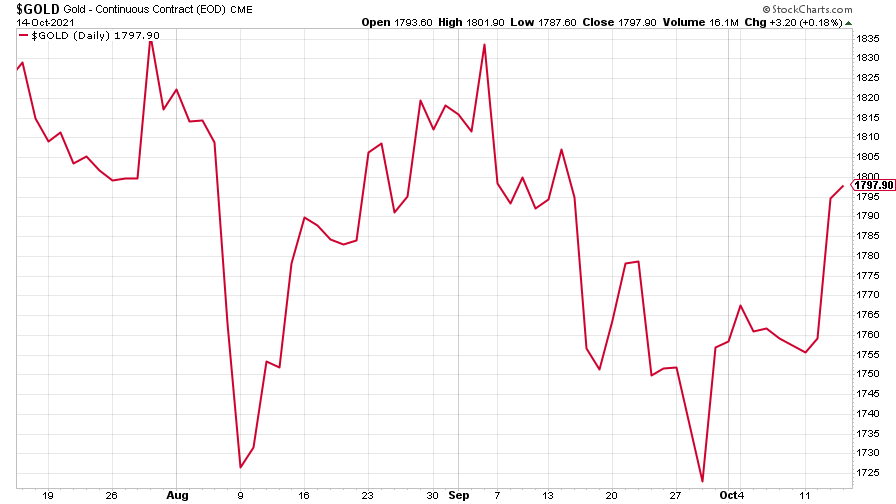
(Gold: three months)
The US dollar index (DXY – a measure of the strength of the dollar against a basket of the currencies of its major trading partners) softened a little after a month of gains.
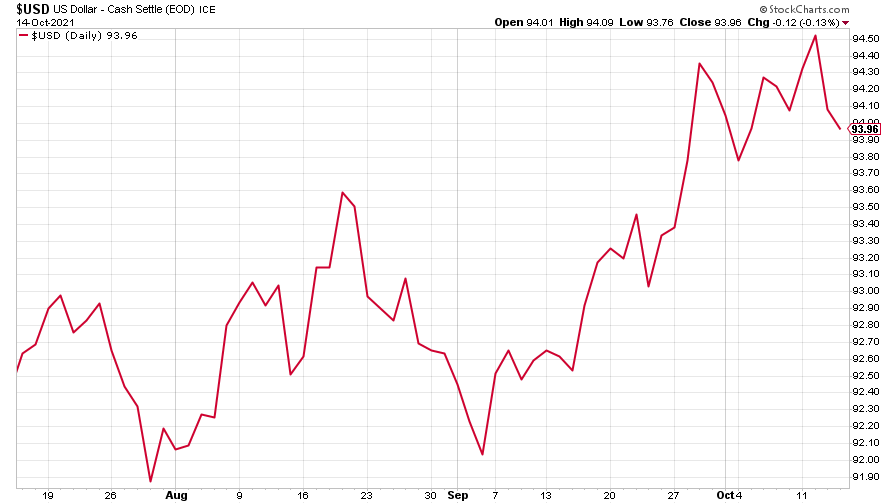
(DXY: three months)
The Chinese yuan (or renminbi) strengthened a little against the dollar (when the red line is rising, the dollar is strengthening while the yuan is weakening).
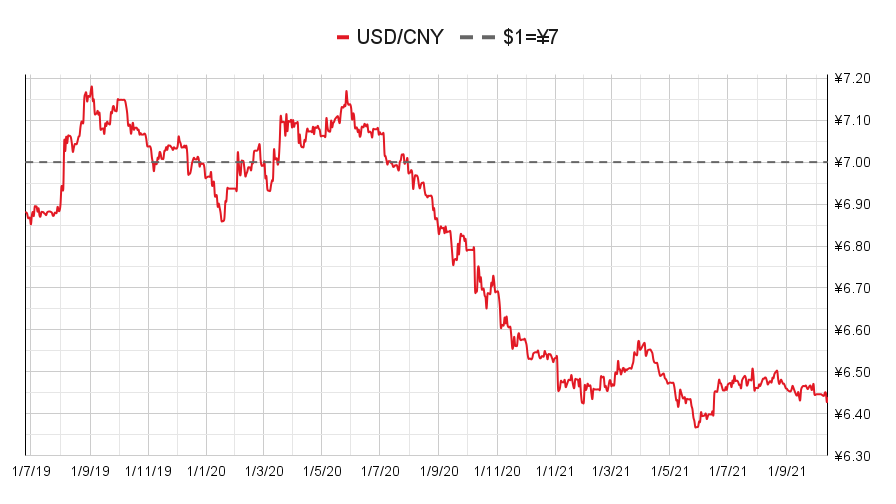
(Chinese yuan to the US dollar: since 25 Jun 2019)
The yield on the ten-year US government bond slipped.
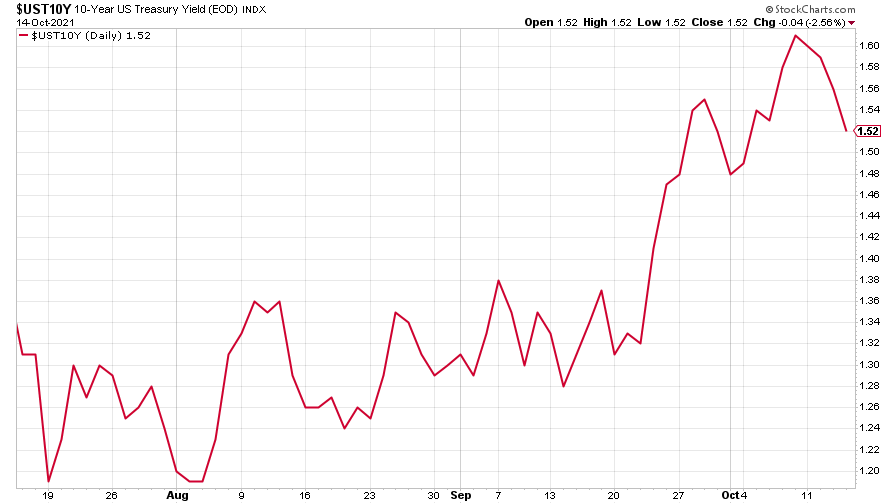
(Ten-year US Treasury yield: three months)
The yield on the Japanese ten-year bond mirrored the moves in US Treasury bond yields.
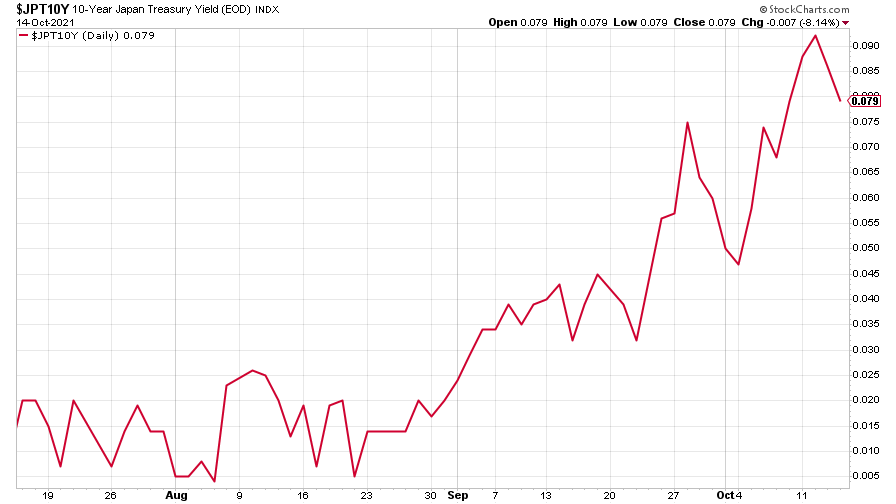
(Ten-year Japanese government bond yield: three months)
And the yield on the ten-year German Bund fell off, too.
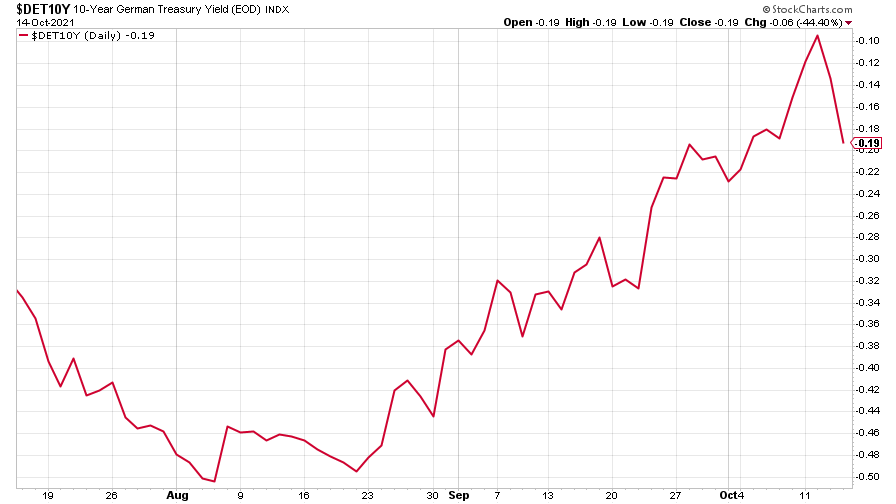
(Ten-year Bund yield: three months)
Copper rose sharply as rising energy prices hampered supply.
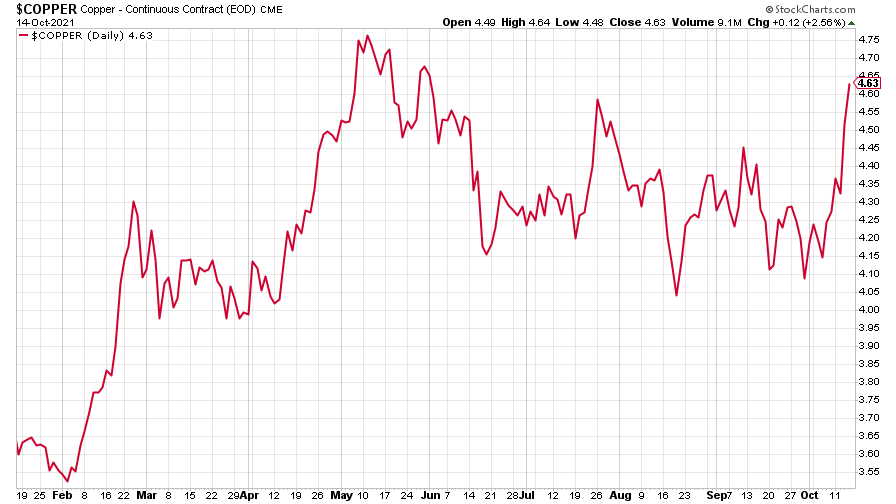
(Copper: nine months)
The closely-related Aussie dollar climbed against the US dollar.
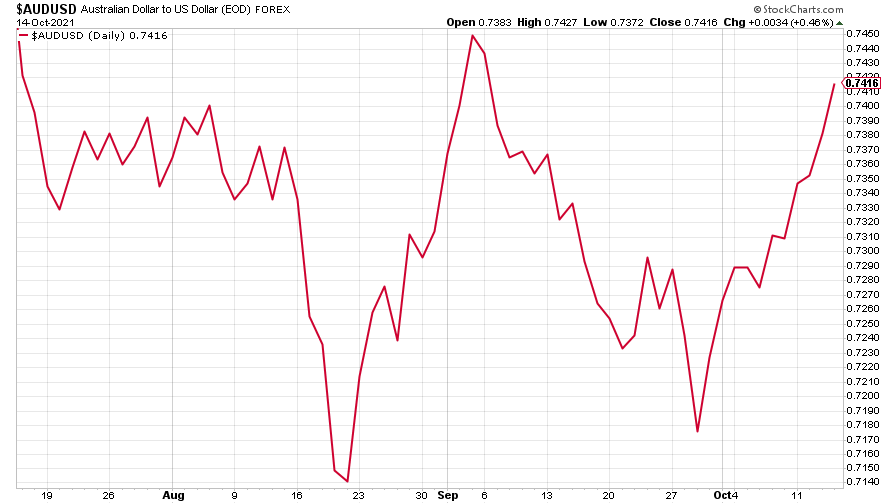
(Aussie dollar vs US dollar exchange rate: three months)
Bitcoin bulls cheered as the price topped $60,000 – not far off its record high.
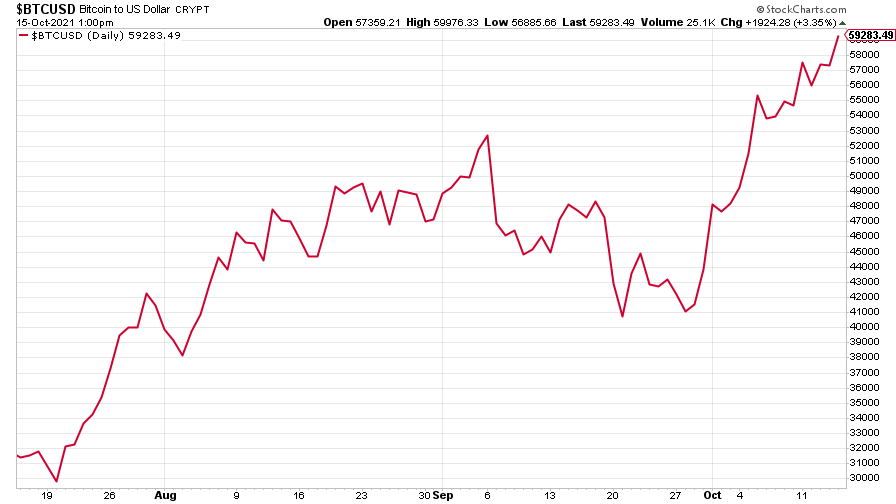
(Bitcoin: three months)
US weekly initial jobless claims fell by 36,000 to 293,000. The four-week moving average fell by 10,500 to 334,250.
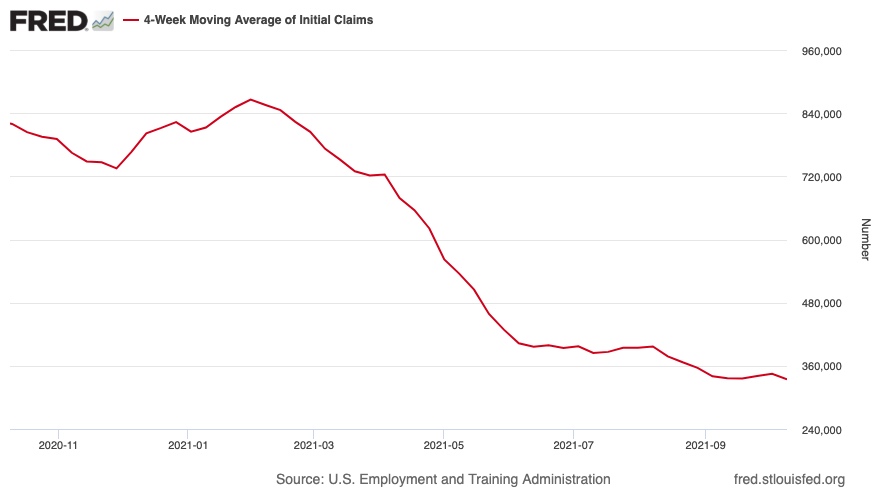
(US initial jobless claims, four-week moving average: since Jan 2020)
The oil price headed even higher.
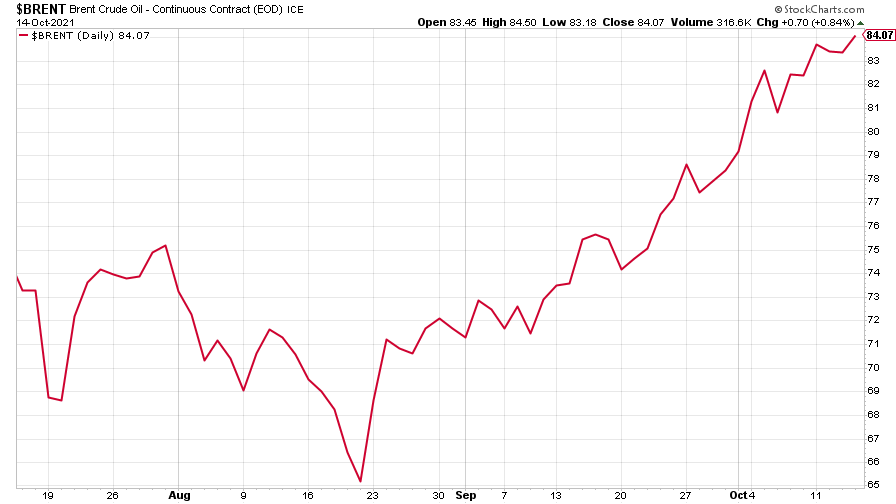
(Brent crude oil: three months)
Amazon recovered some ground after earlier falls.
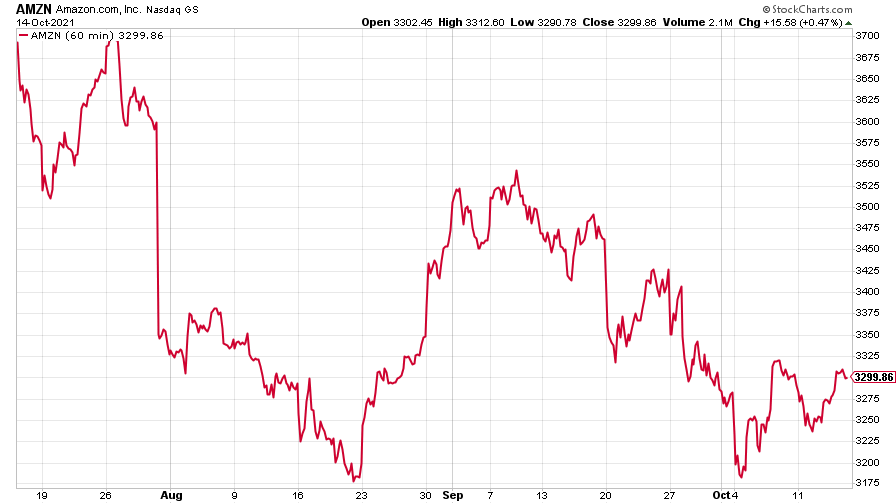
(Amazon: three months)
Tesla continued to climb on news of record sales in China and the company’s Model 3 saloon becoming the UK’s best-selling car in September.
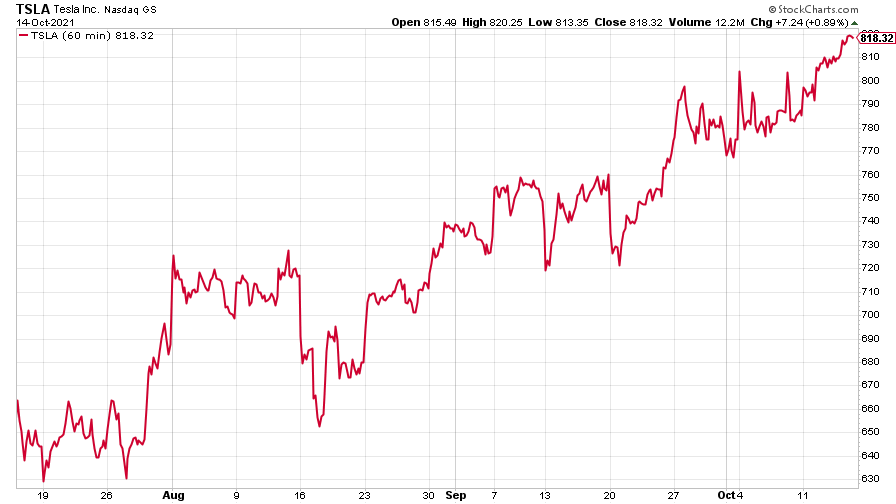
(Tesla: three months)
Have a great weekend.
Ben
Get the latest financial news, insights and expert analysis from our award-winning MoneyWeek team, to help you understand what really matters when it comes to your finances.

-
 Early signs of the AI apocalypse?
Early signs of the AI apocalypse?Uncertainty is rife as investors question what the impact of AI will be.
-
 Reach for the stars to boost Britain's space industry
Reach for the stars to boost Britain's space industryopinion We can’t afford to neglect Britain's space industry. Unfortunately, the government is taking completely the wrong approach, says Matthew Lynn
-
 UK wages grow at a record pace
UK wages grow at a record paceThe latest UK wages data will add pressure on the BoE to push interest rates even higher.
-
 Trapped in a time of zombie government
Trapped in a time of zombie governmentIt’s not just companies that are eking out an existence, says Max King. The state is in the twilight zone too.
-
 America is in deep denial over debt
America is in deep denial over debtThe downgrade in America’s credit rating was much criticised by the US government, says Alex Rankine. But was it a long time coming?
-
 UK economy avoids stagnation with surprise growth
UK economy avoids stagnation with surprise growthGross domestic product increased by 0.2% in the second quarter and by 0.5% in June
-
 Bank of England raises interest rates to 5.25%
Bank of England raises interest rates to 5.25%The Bank has hiked rates from 5% to 5.25%, marking the 14th increase in a row. We explain what it means for savers and homeowners - and whether more rate rises are on the horizon
-
 UK inflation remains at 8.7% ‒ what it means for your money
UK inflation remains at 8.7% ‒ what it means for your moneyInflation was unmoved at 8.7% in the 12 months to May. What does this ‘sticky’ rate of inflation mean for your money?
-
 Would a food price cap actually work?
Would a food price cap actually work?Analysis The government is discussing plans to cap the prices of essentials. But could this intervention do more harm than good?
-
 Is my pay keeping up with inflation?
Is my pay keeping up with inflation?Analysis High inflation means take home pay is being eroded in real terms. An online calculator reveals the pay rise you need to match the rising cost of living - and how much worse off you are without it.
